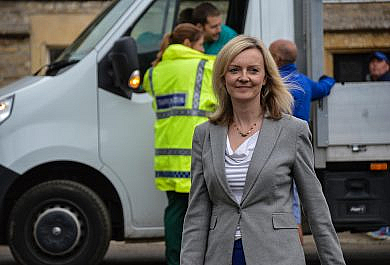Spain’s conservatives underperformed the polls in Sunday’s general election, likely leading to weeks of coalition negotiations or even a second general election later this year.
Summary
Spain’s conservatives underperformed the polls in Sunday’s general election, winning a plurality of seats but failing to secure the margin they needed to oust socialist Prime Minister Pedro Sánchez.
- The conservative Popular Party (Partido Popular or PP), led by Alberto Núñez Feijóo, was expected to win enough seats in the Cortes, the Spanish Parliament, to either form a government on their own or in a coalition with Vox (Voice), the right-wing nationalist party.
- Prime Minister Sánchez’s Socialist Party (Partido Socialista Obero Español, or PSOE) finished second overall, but may hang on to power with the support of the hard-left party Sumar (joining Forces) and smaller leftist parties.
- Sánchez gambled on an early election to catch the opposition off guard and it appears to have paid off.
- Despite the PP’s plurality win of 136 seats to the PSOE’s 122, the right-leaning block suffered from the collapse of Vox to 33 seats, barely ahead of Sumar’s 31.
- The bloc of right-leaning parties broadly aligned with the PP finished with 170 seats in the Cortes, two short of the left-leaning bloc’s 172 seats. Both parties declared victory, but the composition of the next government is far from certain.
- Spain had a two-party system akin to the US from the restoration of democracy in 1975 after the death of dictator Francisco Franco until the early 2010s, when it fractured in the aftermath of the 2008 global financial crisis.
- Three new parties surged onto the scene: the leftist Podemos (We Can), the centrist Ciudadanos (Citizens) and Vox. Podemos has since rebranded as Sumar. As a result, both traditional parties have struggled to form governments over the last decade.
- Spain’s turbulent decade rivals the US for drama. Since 2014, Spain has seen the abdication of King Juan Carlos I under a cloud of scandal, the first-ever successful vote of no confidence that brought down the PP in 2017, and an illegal referendum on Catalonian independence.
- This fractured political landscape has led governments take Spanish voters to the polls five times over the last eight years (2015, 2016, April and November 2019, and 2023) to try and break the deadlock.
- The election, Spain’s first-ever in July, was conducted several months ahead of schedule in the sweltering heat. Sánchez unexpectedly called the snap election after the PSOE was shellacked in the May local and provincial elections.
- Those elections brought to power several PP provincial governments that won control with the support of Vox. Sánchez campaigned heavily against the specter of a PP-Vox coalition government and the hard-right party saw its support collapse on Sunday.
- What comes next is unclear. Both Sánchez and Núñez Feijóo will attempt to cobble together enough support to form a coalition or minority government. If neither party succeeds, that would trigger another general election in December or early next year.
![]()
- The Guardian outlined the formal process for forming a government. King Felipe VI will give Núñez Feijóo the chance to form a government. If he fails, Sánchez may get his own chance to cobble together a governing coalition. If there’s still no government after two months, another election will be called.
- The New York Times observed the PP “had hoped to win an absolute majority and govern without Vox, which many of the party’s own officials consider anachronistic, anathema to Spain’s moderate values and dangerous. As the votes came in, the Popular Party tried to put forward a positive face, saying that it had come in first place… but that wasn’t enough.”
- Politico explained how Sánchez could conceivably stay in power. “Sánchez’s Socialists and his preferred partners, Yolanda Díaz’s left-wing Sumar coalition, control 153 seats in parliament. Although the left-wing allies are unlikely to secure the backing of the 176 MPs needed for Sánchez to be confirmed as prime minister the first time the new parliament votes on the matter, they could make a bid during the second round of voting, in which the candidate to head the new government must receive more yeas than nays.”
![]()
- “Vox’s strident rhetoric against migrants and its denial of man-made climate change are among the issues that many of the PP’s leaders and voters find distasteful,” the Wall Street Journal reported. “That prospect also spooked centrist and leftist voters—and may help explain why the Socialists fared better than expected.”
- Breitbart noted that PP significantly improved their popular support despite falling short of expectations set by pre-election polls. The party increased its support to 33%, an increase from the 21% of the vote they won in the November 2019 election.
- Fox News broke down where the major parties stand on the European Union. “Spain’s two main leftist parties are pro-EU participation. On the right, the PP is also in favor of the EU. Vox, headed by Santiago Abascal, is opposed to EU interference in Spain’s affairs.”
© Dominic Moore, 2023






